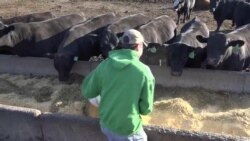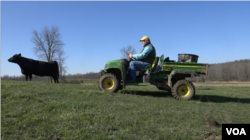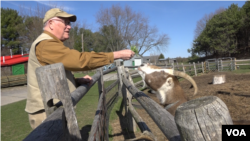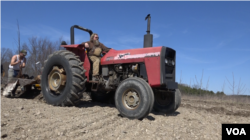When Phil Trowbridge wakes up every morning, he does what any responsible parent would. He checks on the kids and makes sure everyone is healthy and well-fed — feeding time begins promptly at 7 a.m.
At age 60, he has kids and grandkids of his own, but the way he treats his cattle on the farm — all 340 of them — is hardly any different.
Like many upstate New York voters, Trowbridge values hard work and honesty. And he expects no less of his candidates.
His voice, along with millions of non-city residents, form a powerful bloc of voters across the state. Collectively, they represent the backbone of the American middle class. And like anywhere else, the economy, for them, is a top priority.
"Agriculture gets hit probably as hard or harder than anybody," said Trowbridge, who has seen the influence of his industry on U.S. politics decline over the past decades, along with the overall workforce — now less than 2 percent of U.S. workers.
A seed-stock producer in the cattle business, he describes his politics as "pro-choice and anti-union," which puts him somewhere in the middle of the U.S. political spectrum.
To this day, he remains an undecided voter, but he says candidates like Vermont Senator Bernie Sanders and some of his supporters disappoint him.
Trowbridge is not convinced that proposals like tuition-free college are viable business plans.
"He spoon feeds them and they believe it," Trowbridge said. "I'm not sure how they would think he's going to fund what he's talking about."
Importance of the land
For New York agricultural workers, policies such as the farm bill, crop insurance and state minimum wage are important concerns, although they are hardly mentioned on the campaign trail, if at all.
Steve Hadcock, senior resource educator at Cornell Cooperative Extension, said the politics of agricultural workers are overall complicated — there are many factors at play.
"It depends on their own personal philosophy and, to some extent, their family philosophy — how they were brought up; how they were instilled with the importance of the land, the importance of being a successful farmer," Hadcock said.
On the other end of the spectrum, he noted, many farmers are interested in social and food justice.
Peter Ten Eyck, who owns a 300-acre fruit farm just outside Altamont, New York — now in its 100th year — said he is tied to the land.
He was born and raised on the crops he now owns, the third generation to take on the family business.
'Upstate dues'
This election, for him, is about small government. He said former Secretary of State Hillary Clinton is a legitimate candidate that has paid her "upstate dues," but — as a self-described conservative — Ten Eyck said she is too far left, particularly on the role of the federal government.
Ohio Governor John Kasich, he said, might be a good alternative.
"He's a solid guy," Ten Eyck said. "He's done a good job in Ohio, getting a big deficit removed, and balancing a couple budgets."
Similar to Trowbridge, Ten Eyck is not "feeling the Bern." But his employee Timothy Albright, who manages the orchards, is a Sanders fan.
As a Christian, he said he finds that Sanders "espouses the beliefs of Jesus Christ."
"Some of the beliefs of Jesus Christ are that you should be looking out for others — that you should be sympathetic to those in need. And I find his beliefs to be more sympathetic to the needy than any other candidate," said Albright.
One person that Ten Eyck and Albright can agree not to vote for this election is businessman Donald Trump. As Ten Eyck explains, the issue has little to do with policy, and more to do with "rhetoric and demagoguery."
"Anyone who could say, ‘Who would vote for a woman with a face like that?' How could you be proud of having that person be your president?" asked Ten Eyck.
Similarly, Trowbridge is turned off by some of Trump's "edge," although he has not counted him out entirely.
Not a pleasant thought
He imagines what it might be like if Trump or any other candidate were to work on his farm. It isn't a pleasant thought.
"If you talk about humans that way, what would you do to an animal?" he wondered.
Perhaps most importantly, Ten Eyck and Trowbridge agree on personal responsibility. On election day, they insist, you can't stay home.
"My oldest brother has a saying that if you've got a problem, bring the solution. If you don't have the solution, you're the problem," said Trowbridge. "I think there's a lot to be said about that. Because if we don't at least try to vote the very best person we think could be president, then I think we're just not doing our job as citizens."








